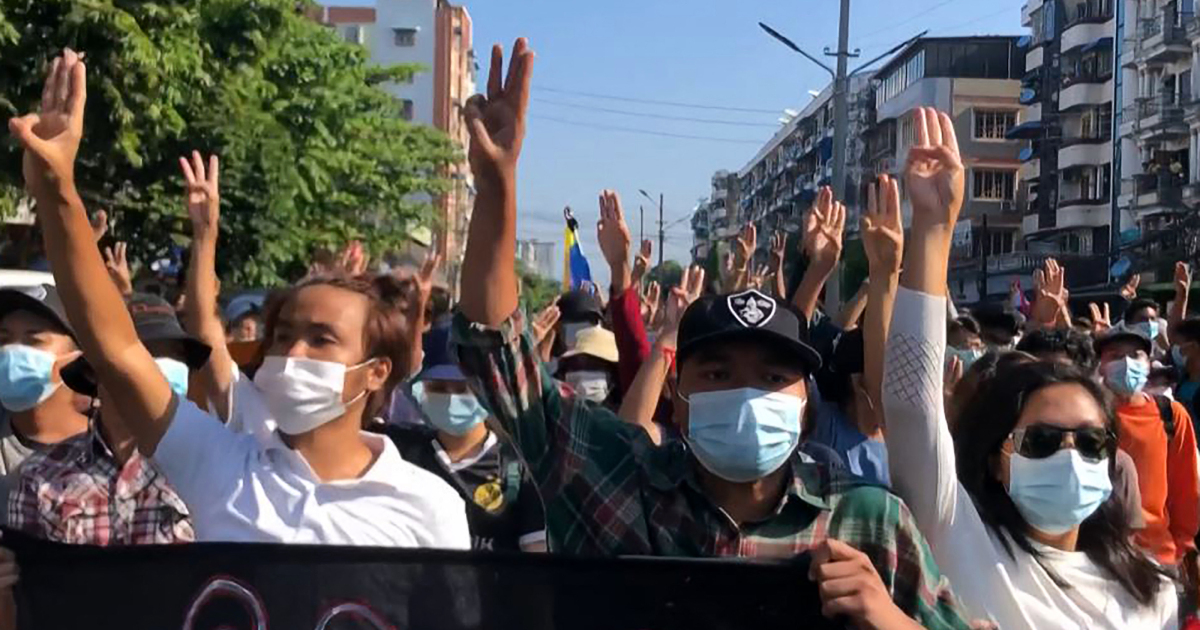At least 8 reported killed in Myanmar anti-coup protests
Largest protests in days draw brutal response from security forces with deaths reported across the country.
At least eight people have been killed in Myanmar after security forces opened fire on some of the biggest protests against military rule in days, three months after a coup plunged the country into political turmoil.
Thousands of people, in towns and cities across the country, joined the protests on Sunday calling for “the Global Myanmar Spring Revolution”. Rallies in support of the anti-coup protests also took place outside Myanmar, as Pope Francis called for peace.
“Shake the world with the voice of Myanmar people’s unity,” the organisers said in a statement.
Two people were shot and killed in Mandalay, the country’s second-biggest city, according to the Mizzima news agency.
The Irrawaddy news site earlier posted a photograph of a man it said was a security officer in plain clothes taking aim with a rifle in Mandalay.
Three people were killed in the central town of Wetlet, the Myanmar Now news agency said, and two were killed in different towns in Shan State in the northeast, two media outlets reported. One person was also killed in the northern jade-mining town of Hpakant, according to the Kachin News Group reported.
The Reuters news agency could not verify the reports and a spokesman for the ruling government did not answer calls seeking comment.
The military seized power from the elected government of Aung San Suu Kyi and the ruling National League for Democracy (NLD) in a coup on February 1, triggered a civil disobedience movement of strikes and mass protests.
People march through Kyaukme in Myanmar’s Shan State as part of Global Myanmar Spring Revolution Day on Sunday [Shwe Phee Myay News Agency via AFP] Long-running conflicts with ethnic armed groups in border areas in the north and east have also intensified, displacing tens of thousands of civilians, according to United Nations estimates.
The military has responded to the protests with arrests and lethal force and ignored calls from neighbouring countries and the UN to end the violence.
In Yangon, young people gathered on a street corner before marching swiftly down the streets in a flash mob – dispersing soon after to avoid a clash with the authorities.
“To bring down the military dictatorship is our cause!” they chanted, waving a three-finger salute in a show of resistance.
In eastern Shan state, youths carried a banner that read: “We cannot be ruled at all”.
Bomb blasts were also reported in different parts of Yangon on Sunday. Explosions have been happening with increasing frequency in the former capital and authorities have blamed them on “instigators”.
There have been no claims of responsibility for the explosions.
The Assistance Association for Political Prisoners (AAPP), which is monitoring the situation, says security forces have killed at least 765 protesters since the coup, while some 4,609 people have been arrested.
The military, which has labelled the AAPP an unlawful organisation, has acknowledged 258 protesters have been killed, along with 17 policemen and seven soldiers.
The generals ruled Myanmar for nearly 50 years until they began a tentative reform process 10 years ago.
Army chief Min Aung Hlaing has said the coup was necessary because of alleged fraud in last November’s election which the NLD won in a landslide. The election commission has said it found no evidence of wrongdoing.
The ongoing violence in Myanmar has raised alarm among the international community.
Rallies in support of the anti-coup movement were held in cities from Taipei to Vancouver and London where exiled Hong Kong politician Nathan Law gave his backing to the protesters.
“We need to mobilise our global system to punish dictators and stop them from killing the people,” he said. “We need a government that serves the people, instead of terrorising them. We need leaders that lead us, not asking us to bow down to them.”
In Rome, meanwhile, Pope Francis prayed during his St Peter’s Square mass on Sunday that Myanmar could “walk the path of meeting, reconciliation and peace”.
Protesters turn out in Taipei in support of Myanmar’s anti-coup movement [Ann Wang/Reuters]













